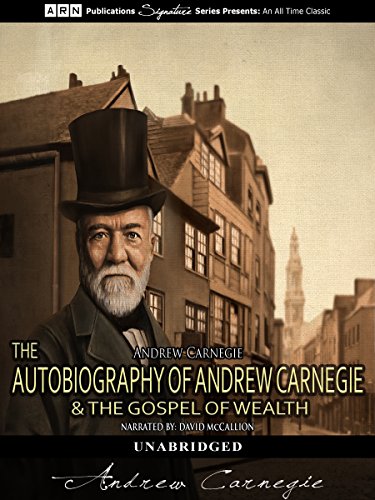The Autobiography of Andrew Carnegie & The Gospel of Wealth (illustrated)
Andrew Carnegie
BOOK REVIEW

In a world where the clamor for wealth can often drown out the whispers of purpose, The Autobiography of Andrew Carnegie & The Gospel of Wealth emerges as a compelling testament to the intertwining of riches and responsibility. Andrew Carnegie, a titan of industry and a figure emblematic of the American Dream, shares his journey from a poor Scottish immigrant to one of the wealthiest men of his era. This book isn't just an account of financial success; it's a call to action, a clarion call for those who hold the reins of power to remember their obligation to humanity.
Carnegie's life story is punctuated by moments that define not only his character but also the very fabric of modern capitalism. Born in 1835 in Dunfermline, Scotland, his family's struggle painted a vivid backdrop against which his ambitions fledged. Here we witness the dramatic upheaval of his youth-a backdrop that inspires both awe and sympathy. His ascent in the world of steel was not merely a product of his calculations in the boardroom; rather, it was a blend of grit, intellect, and an unwavering belief in the potential of self-education and philanthropy.
Yet, it's in The Gospel of Wealth where Carnegie's philosophy truly resonates. He posits that the affluent have a moral duty to channel their fortunes towards societal improvement. This isn't just an ideology; it's a commitment that shaped much of American philanthropic tradition. Carnegie writes with fervor, urging the wealthy to live modestly and to give generously. This could provoke strong emotions, and rightfully so! The echoes of his call ring through the halls of contemporary philanthropy, influencing icons such as Bill Gates and Warren Buffett. Their foundations echo Carnegie's doctrine, proving that the legacy of wealth can be a force for good-or a potential tool of neglect.
Readers have embraced, critiqued, and debated Carnegie's views passionately. Some hail him as a visionary philanthropist whose insights laid the groundwork for modern charity, while others argue that his views on wealth reflect the paradox of capitalism itself-where immense riches exist alongside profound inequality. Reviews often oscillate between praise for his bold ideals and skepticism towards the practicality of his vision. Yet, this very tension is what makes the work essential. It urges us to grapple with the complexities of wealth distribution in today's sociopolitical landscape.
What sets this book apart is its emotional resonance. Carnegie's candid reflections on his roles as an industrialist and a benefactor provoke deep introspection. It forces you to confront pertinent questions: What is the purpose of wealth? How can success be redefined? Should financial gain alone be the ultimate measure of success? These questions linger long after the last page is turned, pushing the reader towards a profound reevaluation of their values and responsibilities.
In blending autobiographical narrative with philosophical insights, Carnegie crafts a timeless dialogue that is just as relevant today as it was over a century ago. His palpable passion ignites the spirit of social responsibility, urging all of us-regardless of our financial standing-towards greater empathy and action.
As you delve into The Autobiography of Andrew Carnegie & The Gospel of Wealth, brace yourself for a whirlwind of emotions-from inspiration to reflection, and perhaps even discomfort. This is not merely a book; it's an invitation to reshape your understanding of wealth and your role within the continuum of society. Will you step up and answer? The world is waiting for your contribution. 🌍✨️
📖 The Autobiography of Andrew Carnegie & The Gospel of Wealth (illustrated)
✍ by Andrew Carnegie
🧾 198 pages
2017
#autobiography #andrew #carnegie #gospel #wealth #illustrated #andrew #carnegie #AndrewCarnegie